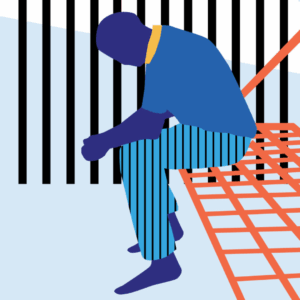
The Royal Gazette, Bermuda
PRESS RELEASE: DNA expert evidence relied on by prosecution to convict a man of murder over 10 years ago was fundamentally flawed
- News
- 31 Oct 2024
Today, the Judicial Committee of the Privy Council formally quashed Julian Washington’s conviction for murder and attempted murder, after he spent over 10 years in prison for a crime he did not commit.
To secure Julian’s conviction, the prosecution in Bermuda relied upon the testimony of a DNA expert at trial. The jury were told Julian’s DNA was found on bullet casings recovered from the scene. In his appeal to the Privy Council, The Death Penalty Project obtained fresh evidence to challenge the DNA expert’s testimony. During the proceedings before the Privy Council, the prosecution conceded that the DNA evidence presented at trial was flawed.
In its judgment, the Privy Council set out its reasons for concluding that a miscarriage of justice had occurred, resulting in Julian’s conviction being set aside. They expressed concern that the inaccurate evidence given by the DNA expert in the proceedings “effectively compelled the jury” to find Julian guilty.
Julian’s case has prompted concerns about other cases in Bermuda and elsewhere, in which the prosecution may have relied on similar flawed expert testimony, rendering any trial unfair and seriously undermining confidence in the administration of justice.
As a result of this case, the Government in Bermuda has confirmed that reviews are being undertaken in nearly 250 cases to correct potential miscarriages of justice.
Background
On 8 January 2012, as he was leaving a friend’s house, Stefan Burgees was killed by a gunman dressed in all black, with a black helmet and visor and black gloves. His friend, Davano Brimmer, was also shot but survived. The shooter fled and six bullet casings were retrieved by officers at the scene.
DNA was recovered from the bullet casings and analysed against the DNA of several suspects, including Julian. Julian’s clothes were seized so that they could be sampled for gunshot residue, but no gunshot residue particles were found. When interviewed by the police, Julian told them that he did not know anything about the murder and had nothing to do with it. He provided an alibi which was corroborated at trial.
Julian was convicted on 6 May 2014 and was sentenced to life imprisonment, with a minimum of 30 years to be served before being considered for release.
DNA evidence
The DNA evidence at trial was analysed by Ms Candy Zuleger, the laboratory director of the now defunct Trinity DNA Solutions, a company based in Florida. Her evidence was instrumental in sending Julian to prison, even though it was based on fundamentally flawed analysis.
At trial, Ms Candy Zuleger told the jury that that there was a 1 in 46,000,000 (forty-six million) chance that the DNA found on the bullet casings was not from Julian. This evidence was inaccurate and should not have been placed before the jury.
The Death Penalty Project initiated Julian’s appeal to the Privy Council in 2022 after obtaining expert evidence that highlighted the serious flaws with the analysis and explanation of the DNA evidence at trial. This prompted the Government to obtain independent expert evidence which agreed that the DNA evidence in Julian’s case should have been deemed inconclusive.
These errors were so serious that, prior to the hearing before the Privy Council, the Government conceded that the DNA evidence was flawed, and Julian’s conviction was unsafe leading to his immediate release from prison on unconditional bail in May 2024.
Julian’s conviction for murder and attempted murder has now been formally quashed by the Privy Council meaning that Julian walks away a free man after spending more than 10 years wrongfully convicted and imprisoned.
Commenting on the failures in this case, the Privy Council stressed the importance of expert witnesses being made aware of their duties to the court, especially where the expert is not from the jurisdiction in which they are giving evidence.
The Government has confirmed that a review of hundreds of prosecutions commenced on 24 April 2024. For all cases in which there was a conviction, and the Crown had relied on DNA analysis from Trinity DNA Solutions, the Government advised that an independent DNA expert would review the matter to determine if there were similar flaws in the evidence.
Parvais Jabbar, Co-Executive Director of The Death Penalty Project said:
“Julian’s case has exposed a problem at the heart of the criminal justice system in Bermuda. Whilst we are delighted that Julian has been publicly vindicated, this is not an isolated incident. There will be more cases in which flawed DNA evidence was used at trial. An urgent independent review is needed to quickly and effectively determine the scale of the problem and remedy further miscarriages of justice.”
Julian Washington said:
“I feel a sense of victory tempered with the bitterness of injustice. The process that led to my wrongful conviction, the flawed evidence and biased testimony that sealed my fate, is a scar that may never fully heal. The wounds of the legal battle run deep, leaving behind a trail of pain, stress, and trauma that lingers in my soul. The pain, stress, and trauma that spread throughout the courtroom affected not just myself, but the families inside the court room as well.”
Notes to editors:
The Death Penalty Project (DPP) is a legal action NGO based at, and supported by, London legal firm, Simons Muirhead Burton LLP. The organisation has special consultative status before the United Nations Economic and Social Council. DPP provides free representation to people facing the death penalty worldwide. It uses the law to protect prisoners facing execution and promote fair criminal justice systems, where the rights of all people are respected.
For interview requests, quotes, or more information please contact DPP’s team: [email protected] and [email protected]
The Legal Team
Julian was represented by Icah Peart KC of Garden Court Chambers (UK), Amanda Clift-Matthews of Doughty Street Chambers (UK) and Vaughan Caines of Forensica Legal (Bermuda), instructed by The Death Penalty Project at Simons Muirhead Burton LLP.
Expert evidence on behalf of Julian in this case was provided by Dr Dan E. Krane who is a Professor of Biological Sciences at Wright State University in Dayton, Ohio, and the President/ CEO of Forensic Bioinformatics Inc.
Trinity DNA Solutions
Trinity DNA Solutions was a Florida-based company. It is understood that Trinity DNA Solutions signed a multi-year contract with the Government of Bermuda in 2009. Ms Candy Zuleger, the then laboratory director of Trinity DNA Solutions, has testified over 230 times as a forensic DNA expert in Alabama, Arizona, Bermuda, Bahamas, Florida (all circuits) and Kansas. It is understood that Trinity DNA Solutions closed in 2018.
The Privy Council
The Judicial Committee of the Privy Council, or ‘the Privy Council’, is the final court of appeal for the UK overseas territories and Crown dependencies, and for those Commonwealth countries that have retained the appeal to His Majesty in Council or, in the case of Republics, to the Judicial Committee.
Sitting at the Supreme Court of the United Kingdom, the Privy Council is formed of the Justices of the UK Supreme Court, and presides over criminal, constitutional and civil appeals of the States and Overseas Territories which appeal to the Privy Council.
Media Coverage
Julian’s case has previously been reported in the media, please see the following links for The Justice Gap, Caribbean News Global and The Royal Gazette for article 1 and article 2.
















